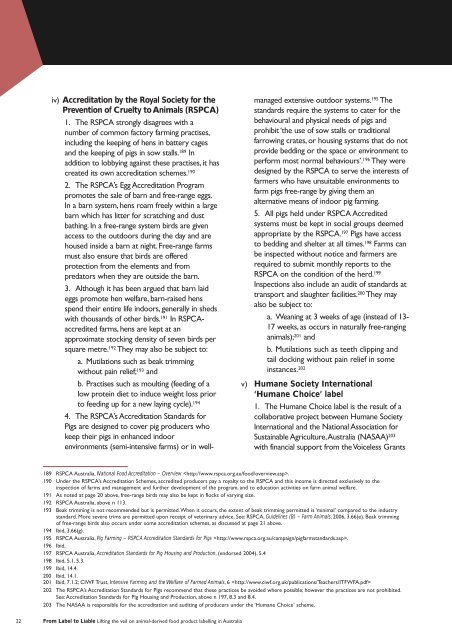From Label to Liable: Scams, Scandals and Secrecy - Voiceless
From Label to Liable: Scams, Scandals and Secrecy - Voiceless
From Label to Liable: Scams, Scandals and Secrecy - Voiceless
Create successful ePaper yourself
Turn your PDF publications into a flip-book with our unique Google optimized e-Paper software.
iv) Accreditation by the Royal Society for the<br />
Prevention of Cruelty <strong>to</strong> Animals (RSPCA)<br />
1. The RSPCA strongly disagrees with a<br />
number of common fac<strong>to</strong>ry farming practises,<br />
including the keeping of hens in battery cages<br />
<strong>and</strong> the keeping of pigs in sow stalls. 189 In<br />
addition <strong>to</strong> lobbying against these practises, it has<br />
created its own accreditation schemes. 190<br />
2. The RSPCA’s Egg Accreditation Program<br />
promotes the sale of barn <strong>and</strong> free-range eggs.<br />
In a barn system, hens roam freely within a large<br />
barn which has litter for scratching <strong>and</strong> dust<br />
bathing. In a free-range system birds are given<br />
access <strong>to</strong> the outdoors during the day <strong>and</strong> are<br />
housed inside a barn at night. Free-range farms<br />
must also ensure that birds are offered<br />
protection from the elements <strong>and</strong> from<br />
preda<strong>to</strong>rs when they are outside the barn.<br />
3. Although it has been argued that barn laid<br />
eggs promote hen welfare, barn-raised hens<br />
spend their entire life indoors, generally in sheds<br />
with thous<strong>and</strong>s of other birds. 191 In RSPCAaccredited<br />
farms, hens are kept at an<br />
approximate s<strong>to</strong>cking density of seven birds per<br />
square metre. 192 They may also be subject <strong>to</strong>:<br />
a. Mutilations such as beak trimming<br />
without pain relief; 193 <strong>and</strong><br />
b. Practises such as moulting (feeding of a<br />
low protein diet <strong>to</strong> induce weight loss prior<br />
<strong>to</strong> feeding up for a new laying cycle). 194<br />
4. The RSPCA’s Accreditation St<strong>and</strong>ards for<br />
Pigs are designed <strong>to</strong> cover pig producers who<br />
keep their pigs in enhanced indoor<br />
environments (semi-intensive farms) or in wellmanaged<br />
extensive outdoor systems. 195 The<br />
st<strong>and</strong>ards require the systems <strong>to</strong> cater for the<br />
behavioural <strong>and</strong> physical needs of pigs <strong>and</strong><br />
prohibit ‘the use of sow stalls or traditional<br />
farrowing crates, or housing systems that do not<br />
provide bedding or the space or environment <strong>to</strong><br />
perform most normal behaviours’. 196 They were<br />
designed by the RSPCA <strong>to</strong> serve the interests of<br />
farmers who have unsuitable environments <strong>to</strong><br />
farm pigs free-range by giving them an<br />
alternative means of indoor pig farming.<br />
5. All pigs held under RSPCA Accredited<br />
systems must be kept in social groups deemed<br />
appropriate by the RSPCA. 197 Pigs have access<br />
<strong>to</strong> bedding <strong>and</strong> shelter at all times. 198 Farms can<br />
be inspected without notice <strong>and</strong> farmers are<br />
required <strong>to</strong> submit monthly reports <strong>to</strong> the<br />
RSPCA on the condition of the herd. 199<br />
Inspections also include an audit of st<strong>and</strong>ards at<br />
transport <strong>and</strong> slaughter facilities. 200 They may<br />
also be subject <strong>to</strong>:<br />
a. Weaning at 3 weeks of age (instead of 13-<br />
17 weeks, as occurs in naturally free-ranging<br />
animals); 201 <strong>and</strong><br />
b. Mutilations such as teeth clipping <strong>and</strong><br />
tail docking without pain relief in some<br />
instances. 202<br />
v) Humane Society International<br />
‘Humane Choice’ label<br />
1. The Humane Choice label is the result of a<br />
collaborative project between Humane Society<br />
International <strong>and</strong> the National Association for<br />
Sustainable Agriculture, Australia (NASAA) 203<br />
with financial support from the <strong>Voiceless</strong> Grants<br />
189 RSPCA Australia, National Food Accreditation – Overview .<br />
190 Under the RSPCA’s Accreditation Schemes, accredited producers pay a royalty <strong>to</strong> the RSPCA <strong>and</strong> this income is directed exclusively <strong>to</strong> the<br />
inspection of farms <strong>and</strong> management <strong>and</strong> further development of the program, <strong>and</strong> <strong>to</strong> education activities on farm animal welfare.<br />
191 As noted at page 20 above, free-range birds may also be kept in flocks of varying size.<br />
192 RSPCA Australia, above n 113.<br />
193 Beak trimming is not recommended but is permitted. When it occurs, the extent of beak trimming permitted is ‘minimal’ compared <strong>to</strong> the industry<br />
st<strong>and</strong>ard. More severe trims are permitted upon receipt of veterinary advice. See: RSPCA, Guidelines (B) – Farm Animals, 2006, 3.66(e). Beak trimming<br />
of free-range birds also occurs under some accreditation schemes, as discussed at page 21 above.<br />
194 Ibid, 3.66(g).<br />
195 RSPCA Australia, Pig Farming – RSPCA Accreditation St<strong>and</strong>ards for Pigs .<br />
196 Ibid.<br />
197 RSPCA Australia, Accreditation St<strong>and</strong>ards for Pig Housing <strong>and</strong> Production, (endorsed 2004), 5.4<br />
198 Ibid, 5.1, 5.3.<br />
199 Ibid, 14.4.<br />
200 Ibid, 14.1.<br />
201 Ibid, 7.1.2; CIWF Trust, Intensive Farming <strong>and</strong> the Welfare of Farmed Animals, 6 <br />
202 The RSPCA’s Accreditation St<strong>and</strong>ards for Pigs recommend that these practices be avoided where possible; however the practices are not prohibited.<br />
See: Accreditation St<strong>and</strong>ards for Pig Housing <strong>and</strong> Production, above n 197, 8.3 <strong>and</strong> 8.4.<br />
203 The NASAA is responsible for the accreditation <strong>and</strong> auditing of producers under the ‘Humane Choice’ scheme.<br />
22<br />
<strong>From</strong> <strong>Label</strong> <strong>to</strong> <strong>Liable</strong> Lifting the veil on animal-derived food product labelling in Australia


